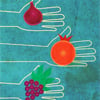Several Torah commandments involving agricultural practices in the Land of Israel apply even when the products are exported to other countries. Recent estimates are that Israel exports over seven billion dollars worth of agricultural products per year, all subject to the Torah's agricultural laws.
Any food from Israel, whether fresh or packaged, requires reliable supervision. Israeli produce has become common in American supermarkets. Jaffa oranges are the most famous, but one can also find Israeli tomatoes and other produce. Packaged and processed foods from Israel such as crackers, soups, and candies are also widely available. All of these foods must comply with the following agricultural laws:
T'rumah and Ma'aser
Gifts for those who served in the Holy Temple. When the Jewish people settled in the land of Israel, eleven tribes received a portion of land as an inheritance. The twelfth tribe, Levi, comprised of Levi' im and Kohanim, did not receive portions of land. Their lives were to be devoted to serving G‑d in the Holy Temple, not to working the land. The other tribes, known collectively as Israelites, were commanded to give to the tribe of Levi the "first fruits of corn, of thy wine, and of thine oil, and the first of the fleece of thy sheep." (Deuteronomy 28:4)
By giving a portion of the land's produce to the Kohanim and Levi'im, living representatives of G‑d and the Torah, the Jews made tangible the concept that material possessions must be used in the service of spiritual life.
In addition, a certain percentage of the crops were to be designated for the poor (ma'aser oni) and a certain part to be eaten only in Jerusalem (ma'aser sheni).
Even today, fruits, vegetables, and grains grown in the Land of Israel are subject to the laws of t'rumah and ma'aser. Although these special portions are no longer consumed, the food may not be eaten until the portions of t'rumah and ma'aser are separated. Consult an orthodox rabbi for practical guidance in applying these laws.
Shmittah
A year of rest for the land. Every seventh year in the Land of Israel is a "sabbatical" year for the land, just as every seventh day is a Sabbath day for each individual Jew: "You may plant your land for six years and gather its crops. But during the seventh year, you must leave it alone and withdraw from it. The needy among you will then be able to eat from your fields just as you do..." (Exodus 23:10-I I )
Farmers in Israel who observe the shmittah year proclaim their faith in G‑d, Who promised to give a blessing in the sixth year so that their needs would be more than met in the seventh. No food may be grown or cultivated during this year, and all poor or needy people are welcome to collect any crops remaining in the fields. It is forbidden to eat food grown by a Jew in Israel during the shmittah year.
Orlah:
The fruit of young trees. Fruit which has grown in the first three years of a tree's existence is called orlah and may not be used. Even in the fourth year certain restrictions apply. Supervison is therefore necessary on fruit from Israel. However, for fruit grown outside of Israel, only that fruit which is definitely known to be orlah is prohibited.



Join the Discussion